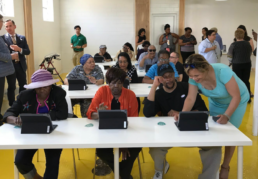Smart District Engagement: Neighborhood Pilot Projects
Year Complete: 2018
Grant Category: Equity Pilot Initiative
Grant Amount: $75,000
Local Government: City of Charlotte, NC
Local Foundation: Ortho Carolina Foundation, John S. and James L. Knight Foundation
Project Purpose
To use a racial equity lens to create a replicable community engagement blueprint for the development and implementation of several “smart” city pilot projects.
Key Lessons Learned
Lessons learned about tools and tactics through the project that other sustainability directors could use to advance their work.
- Trust in partners is crucial.
- Ensure all partners have shared goals.
- Communication with participants must be coordinated between partners.
- Community ownership is crucial to success.
- Technology isn’t readily accessible to everyone.
- Diversity of partners creates robust programs.
- Understand local meaning of your words.
- How a community defines itself may be different than how external parties view it.
- Sometimes you must let the people discover it on their own.
- Finding a balance between leading and being led.
- Meet people where they are.
- Be honest about how change has happened.
- Staff leadership is needed in community-led work.
- Participate in partner’s activities beyond the shared project to strengthen relationships.
- Commitment and communication are required to navigate uncharted projects.
Lessons for developing a collaborative process between a local government sustainability director and local place-based foundation(s).
- Ask Community leaders to identify the best time for public meetings.
- Be mindful of religious or cultural schedules.
- Hold meetings in the district, rather than expecting folks to come to City Hall.
- Reduce barriers to participation of families by including free childcare.
- Reduce barriers to participation by including meals for participants.
- Ask Community leaders to play a major role in crafting the message for the communities.
- Think about the power of language and its relationship to the history of the community.
- Use community-sourced vendors when possible, and take every meeting as an engagement to make connections with people, schools, businesses etc.
- Invest in people and co-creation.
- Invest resources in multiple modes of communication.
- Collect information about race and age at public meetings to test if participants reflect the demographic composition of the area.
Additional Information and Resources
The ongoing involvement with the Kick Start projects is owned by the Department of Sustainability. In the immediate future, interim steps to keep each Kick Start progressing were identified and is supported through an external project management partner who has been assisting each of the teams through the execution phase. A robust 3-5 year plan is being developed for the NESD that includes Phase 2 planning for each of the four Kick Starts.
The city received a commendation as an All-American City Finalist based, in part, on the Smart District initiative.

